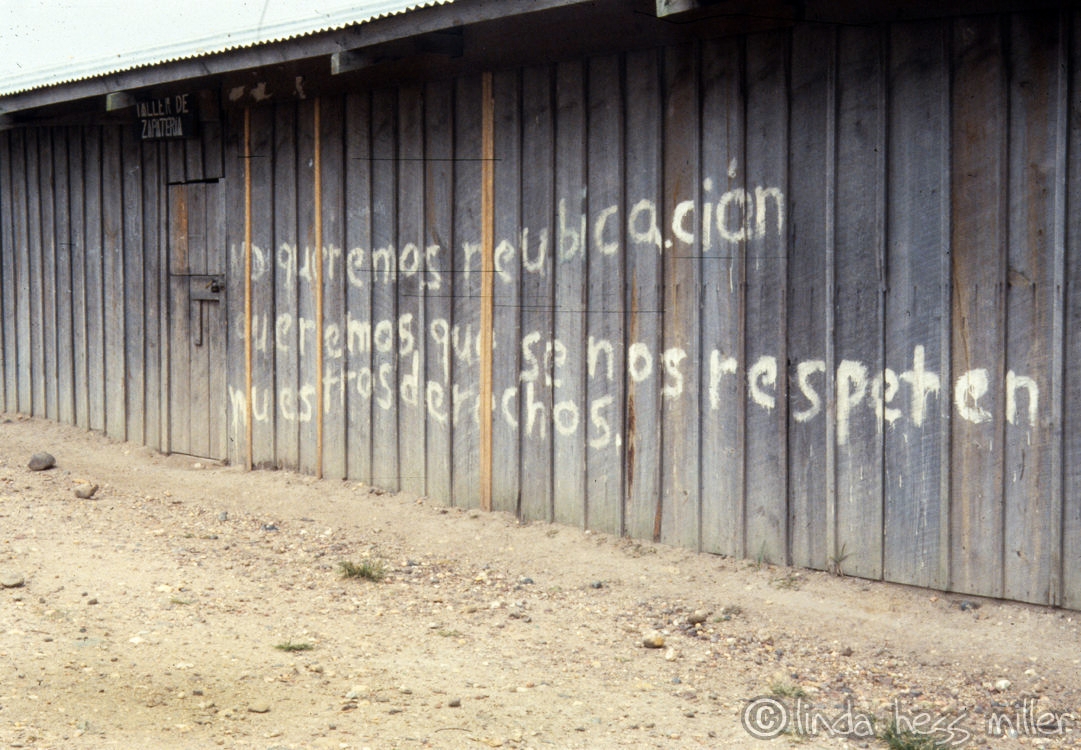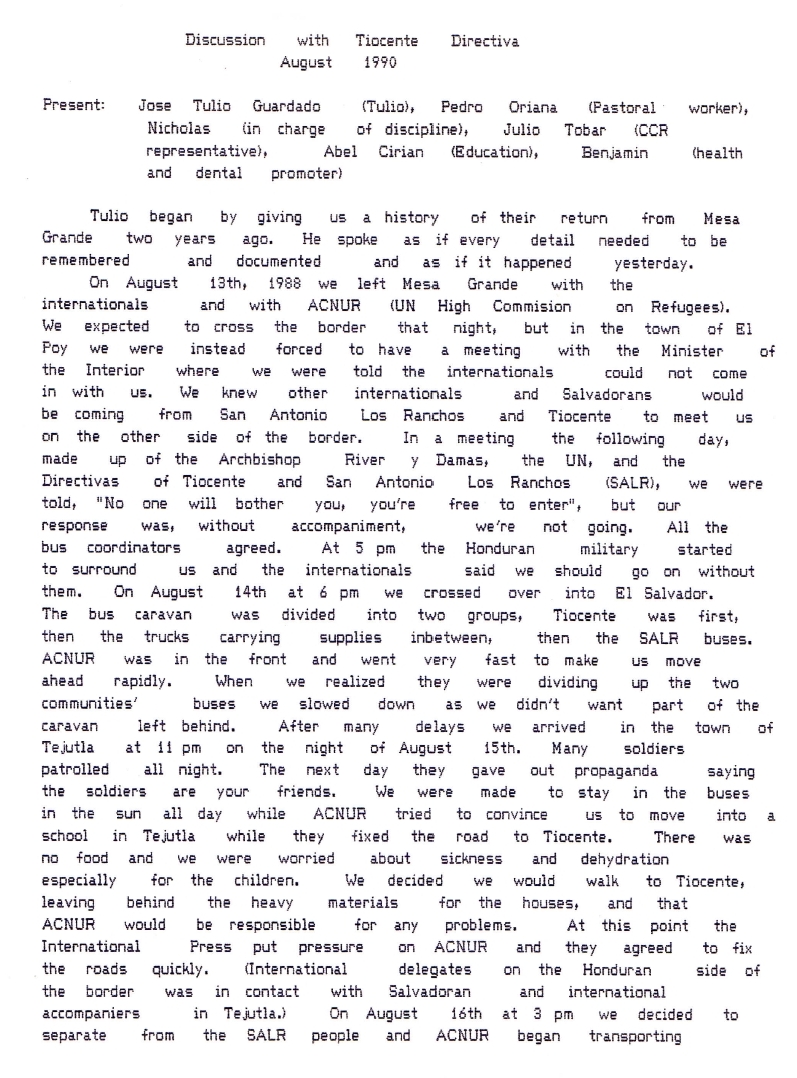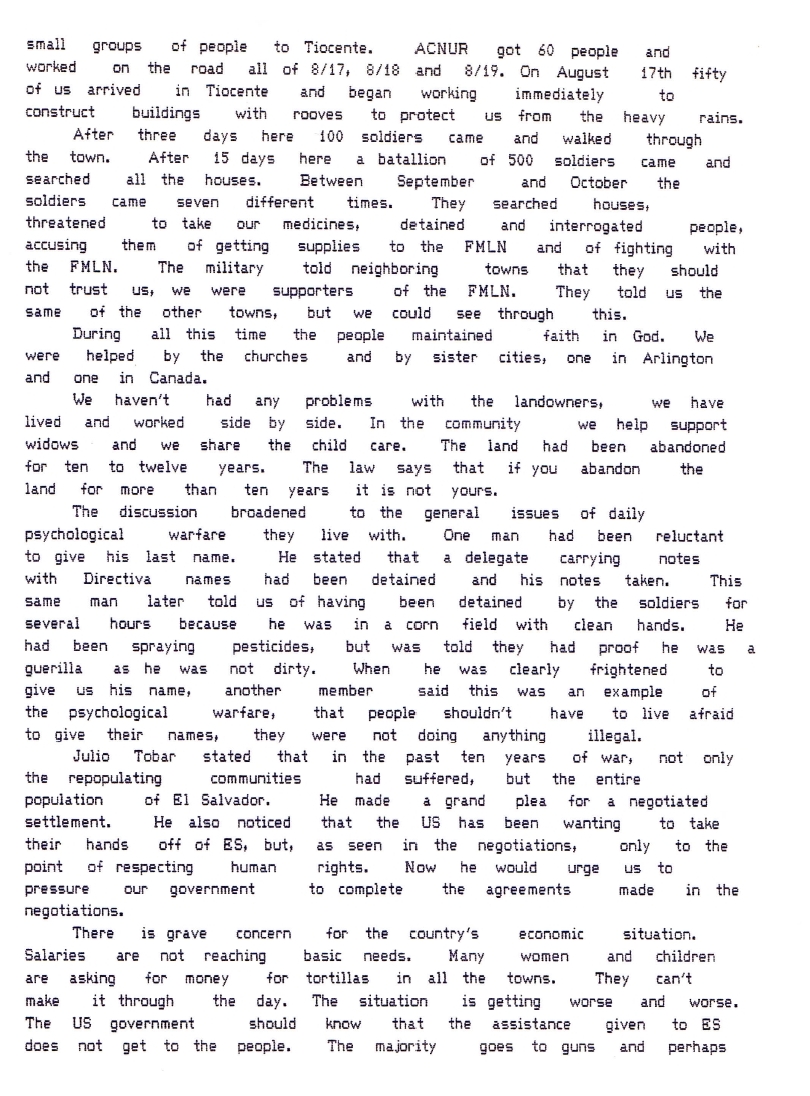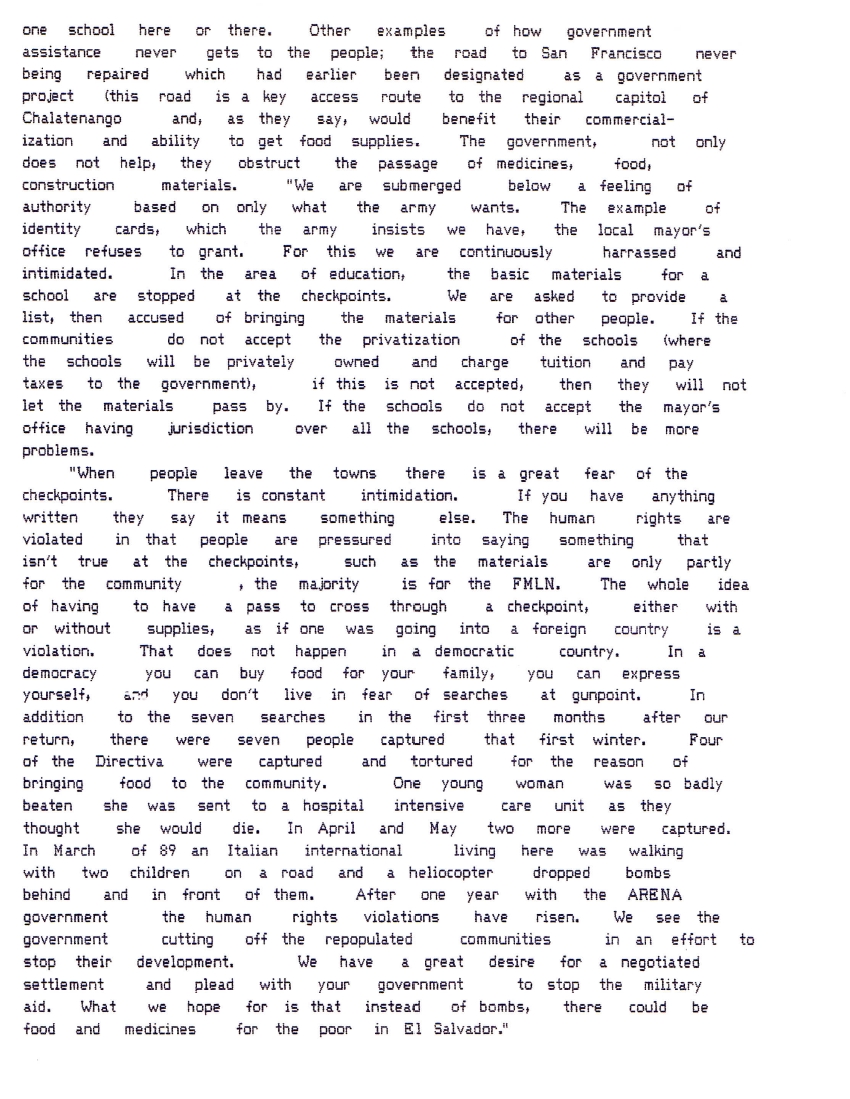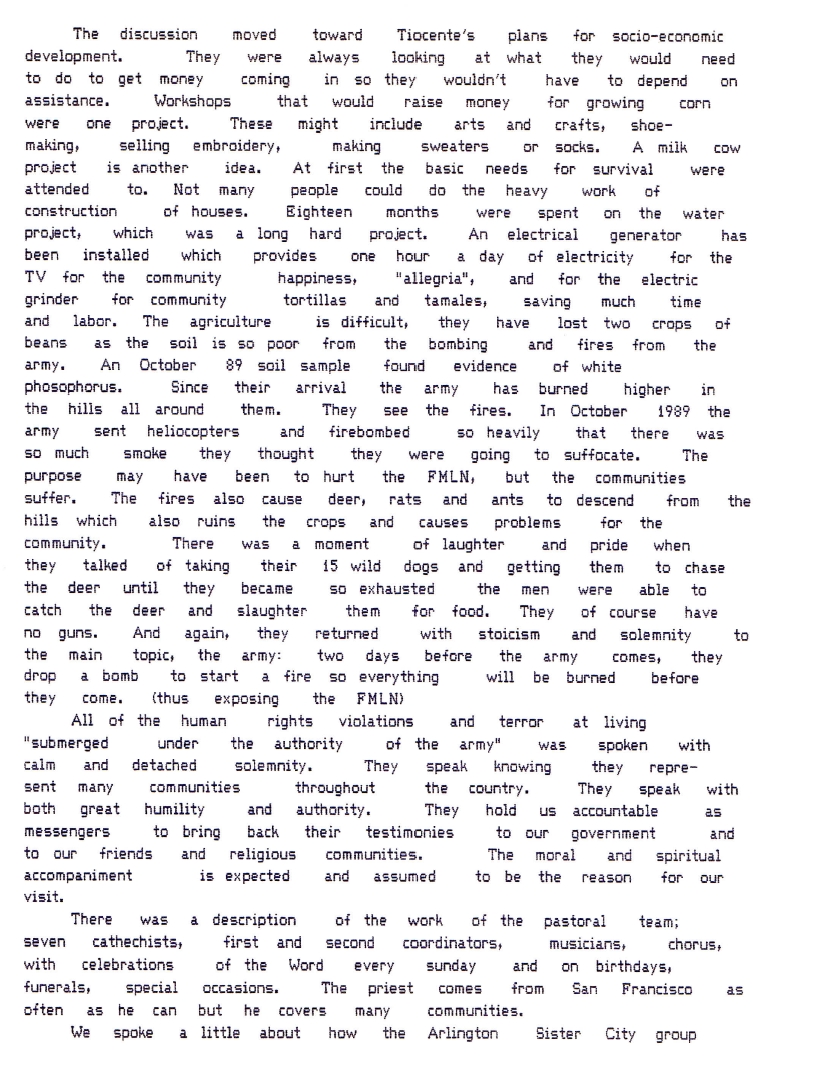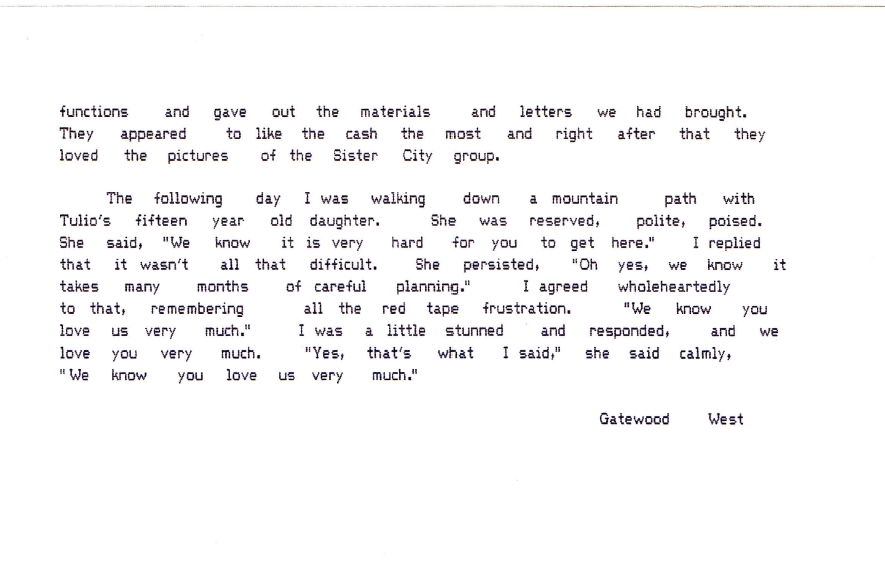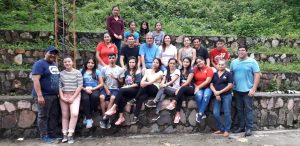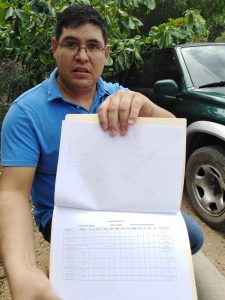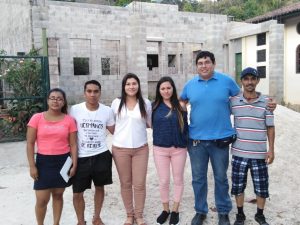Historical Memory, Human Rights, Online Resources
Teosinte’s history – where we we come from
(EN ESPAÑOL ABAJO)
Back in 1990, Gatewood West visited Teosinte and he met José Tulio Guardado, Pedro Oriana, Nicolas, Julio Tobar (from the CCR), Abel Cirian and Benjamin. He wrote a report of their conversation back then.
Challenging times are ahead but we must never forget how the Salvadoran people in rural and forgotten areas were able to come together and work side by side against the odds.
Tulio started by sharing:
After three days here 100 soldiers came and wlaked through the town. After 15 days here a batallion of 500 soldiers came and searched all the houses. Between September and October the soldiers came seven different times. They searched houses, threatened to take our medicines, detained and interrogated people, accusing them of getting supplies to the FMLN and of fighting with the FMLN. The military told neighboring towns that they should not trust us, we were supporters of the FMLN. They told us the same of the other towns, but we could see through this.
…
We haven’t had any problems with the landowners, we have lived and worked side by side. In the community we help support widows and we share the child chare. The land had been abandoned for ten to twelve years…
The discussion broadened to the general issues of daily psychological warfare they live with. One man had been reluctant to give his last name. He stated that a delegate carrying notes with Directiva names had been detained and his notes taken. The same man later told us of having been detained by the soldiers for several hours because he was in a corn field with clean hands. He had been spraying pesticides, but was told they had proff he was a guerrilla as he was not dirty. When he was clearly frightened to give us his name, another member said this was an example of the psychological warfare, that people shouldn’t have to live afraid to give their names, they were not doing anything illegal.
Julio Tobar stated that in the past ten years of war, not only the repopulating communities had suffered, but the entire population of El Salvador. He made a grand plea for a negotiated settlement. He also noticed that the US has been wanting to take their hands off of ES (EL SALVADOR), but, as seen in the negotiations, only to the point of respecting human rights. Now he would urge us to pressure our government to complete the agreements made in the negotiations.
There is a grave concern for the country’s economic situation. Salaries are not reaching basic needs. Many women and children are asking for money for tortillas in all the towns. They can’t make it through the day. The situation is getting worse and worse. The US government should know that the assistance given to ES does not get to the people. The majority goes to guns and perhaps one school here or there.
“We are submerged below a feeling of authority based on only what the army wants. The example of identity cards, which the army insists we have, the local mayor’s office refuses to grant. For this we are continuously harrassed and intimidated (…) If the communities do not accept the privatization of the schools (where the schools will be privately owned and charge tuition and pay taxes to the government), if this is not accepted, then they will not let the materials pass by. If the schools do not accept the mayor’s office having jurisdiction over all the schools, there will be more problems.
“When people leave the towns there is a great fear of the checkpoints. There is constant intimidation (…) The whole idea of having to have a pass to cross through a checkpoint, either with or without supplies, as if one was going into a foreign country is a violation. That does not happen in a democratic country…”
The agriculture is difficult, they have lost two crops of beans as the soil is so poor from the bombing and fires from the army. An October 89 soil sample found evidence of white phosophorus.
All of the human rights violations and terror at living “submerged under the authority of the army” was spoken with calm and detached solemnity. They speak knowing they represent many communities throughout the country. They speak with both great humility and authority. They hould us accountable as messengers to bring back their testimonies to our government and to our friends and religious communities.
Read the full report below:
USESSC believes in the important role historical memory can play to develop better socities. If you want to engage with our historical memory group or you’re interested in developing a workshop about this subject with a popular education approach, don’t hesitate in contacting us.
***
En 1990, Gatewood West visitó Teosinte y conoció a José Tulio Guardado, Pedro Oriana, Nicolas, Julio Tobar (del CCR), Abel Cirian y Benjamin. Escribió un reporte de su conversación de entonces.
Se avecinan tiempos difíciles, pero nunca debemos olvidar cómo el pueblo salvadoreño de las zonas rurales y olvidadas pudo unirse y trabajar codo con codo contra todo pronóstico.
Tulio comenzó compartiendo:
Después de tres días aquí llegaron 100 soldados y atravesaron la ciudad. Después de 15 días aquí, vino un batallón de 500 soldados y registró todas las casas. Entre septiembre y octubre, los soldados vinieron en siete ocasiones distintas. Registraron casas, amenazaron con llevarse nuestras medicinas, detuvieron e interrogaron a personas, acusándolas de llevar suministros al FMLN y de luchar con el FMLN. Los militares les dijeron a los pueblos vecinos que no debían confiar en nosotros, que éramos simpatizantes del FMLN. Nos dijeron lo mismo de los otros pueblos, pero sabíamos lo que estaban haciendo.
…
No hemos tenido problemas con los terratenientes, hemos vivido y trabajado codo con codo. En la comunidad ayudamos a mantener a las viudas y el cuido de los niños. La tierra había estado abandonada durante diez o doce años …
La discusión se amplió a los problemas generales de la guerra psicológica con la que viven diariamente. Un hombre se había mostrado reacio a dar su apellido. Indicó que una vez se detuvo a un delegado que llevaba notas con los nombres de la Directiva y tomaron sus notas. El mismo hombre nos contó más tarde que los soldados lo detuvieron durante varias horas porque estaba en una milpa con las manos limpias. Había estado rociando plaguicidas, pero le dijeron que sabían que era un guerrillero porque no estaba sucio. Cuando estaba claramente asustado de darnos su nombre, otro miembro dijo que este era un ejemplo de la guerra psicológica, que la gente no debería tener que vivir con miedo de dar sus nombres, que no estaban haciendo nada ilegal.
Julio Tobar afirmó que en los últimos diez años de guerra, no solo han sufrido las comunidades repobladas, sino toda la población de El Salvador. Hizo un llamado por un acuerdo negociado. También advirtió que Estados Unidos ha querido apartar las manos de El Salvador, pero, como se vio en las negociaciones, solo hasta el punto de respetar los derechos humanos. Ahora nos invita a presionar a nuestro gobierno para que complete los acuerdos alcanzados en las negociaciones.
Existe una gran preocupación por la situación económica del país. Los salarios no cubren las necesidades básicas. Muchas mujeres y niños piden dinero para las tortillas en todos los pueblos. No pueden pasar el día. La situación empeora cada vez más. El gobierno de los EE. UU. debe saber que la asistencia brindada a El Salvador no llega a la gente. La mayoría va para armas y quizás a una escuela aquí o allá.
“Estamos sumergidos bajo un sentimiento de autoridad basado solo en lo que quiere el ejército. El ejemplo de las cédulas de identidad, que el ejército insiste en que tengamos, la alcaldía local se niega a otorgar. Por eso somos continuamente acosados e intimidados (… ) Si las comunidades no aceptan la privatización de las escuelas (donde las escuelas serán propiedad privada y cobrarán matrículas y pagarán impuestos al gobierno), si esto no es aceptado, entonces no dejarán pasar los materiales. Si las escuelas no aceptan que la alcaldía tenga jurisdicción sobre todas las escuelas, habrá más problemas.
“Cuando la gente sale de los pueblos hay un gran miedo a los retenes. Hay constante intimidación (…) Tener que tener un pase para cruzar un retén, ya sea con o sin víveres, como si se estuviera yendo a un país extranjero es una violación. Eso no sucede en un país democrático… “
La agricultura es difícil, han perdido dos cosechas de frijoles porque el suelo es muy pobre por los bombardeos y los incendios del ejército. Una muestra de suelo de octubre del 89 encontró evidencia de fósforo blanco.
Todas las violaciones de los derechos humanos y el terror de vivir “sumergido bajo la autoridad del ejército” se expresaron con calma y solemnidad indiferente. Hablan sabiendo que representan a muchas comunidades en todo el país. Hablan con gran humildad y autoridad. Ellos nos demandan que seamos mensajeros y llevemos sus testimonios a nuestro gobierno y a nuestros amigos y comunidades religiosas.

